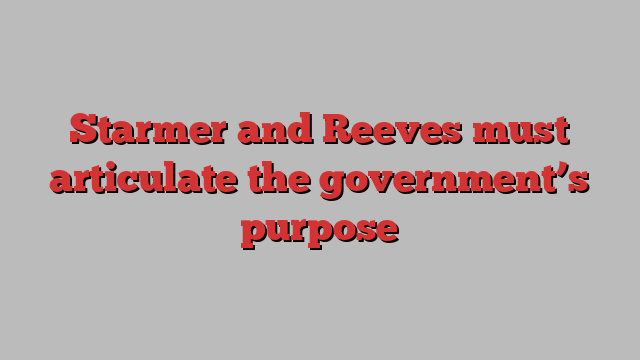
Unlock the Editor’s Digest for free
Roula Khalaf, Editor of the FT, selects her favourite stories in this weekly newsletter.
The writer is a political strategist at BCW communications and former political secretary to Tony Blair
As the Labour party heads to its conference — less than 100 days after a landslide victory in the general election — ministers are dogged by the furore over dropping the winter fuel allowance for more than 9mn pensioners.
This row has rumbled on since Rachel Reeves announced the cut in her Commons statement on July 29. Judging by Labour MPs’ inboxes, anger from and on behalf of pensioners is not abating. And it is the backdrop against which all other issues are being judged. Would “Goonergate” and the other donations to Sir Keir Starmer bite so hard if his government weren’t taking hundreds of pounds from pensioners this winter?
There are good arguments for targeting the winter fuel allowance on those in need. What is most interesting is that Labour has declined to make them. Instead, the party line is a version of Reeves in July: “Let me be clear, this is not a decision I wanted to make.”
The problem with that statement goes to the heart of political leadership. When a party is elected on a one-word platform of “Change”, the electorate want to see it rather than hear: “Treasury says no.” And while most voters don’t understand the details or intricacies of public finances, they sense that a saving of £1.4bn is money that can be found in other ways in a budget of more than a trillion pounds. When they hear no better arguments than “we don’t want to do this”, they become even less sympathetic to the government.
What is at stake over this issue and what needs to be set out politically, practically and rhetorically in the speeches of Reeves and Starmer at the conference this week is: what is the project of the Labour government? It has to be more than balancing the books — if the country had wanted that, they would have appointed book-keepers to take over from the Tories.
Labour’s five national missions, and Starmer’s promise of a decade of national renewal, sketched out that broader project during the election. But, apart from Ed Miliband’s dynamism on the green transition and its part in economic renewal, there have been few attempts to bring actions, politics and narrative together in the way the missions envisage. Achieving the fastest growth in the G7 is an ambitious, mobilising ambition. But Labour can’t cut its way there — it needs a plan.
So far that plan has been residualised to “things will get worse before they get better”, which is heard by voters as things will definitely get worse — they have a proof point of that in the treatment of pensioners. Where’s the hope?
Progressive governments succeed when they own the future and have a vision of how it could be better and fairer: that’s what the New Labour slogans meant. Gordon Brown’s “prudence with a purpose” got it right (and would be apt for the moment the UK is now faced with). The inheritance is difficult, rebuilding is imperative, it will take time and effort but there will be a pay-off.
Similarly, Labour’s mandate at the election was to rebuild public services, not to rebuild the public finances at any cost — what a better future would look like must be the red thread running through all Starmer’s government says and does.
In the end, the “vision thing” is the difference between leaders and managers. So many things were done badly and incompetently by the last four prime ministers that it must often feel to Labour ministers that refraining from harm is all there is to delivering change. But they also need to do the right thing. That’s the message Starmer and Reeves need to put at the heart of their conference, with its slogan “Change begins”.
When a government is doing the right thing — by its own values and according to its mandate — then ministers can always make a case and mount a defence, even for controversial decisions. To govern is to choose — but also to fight and win arguments.